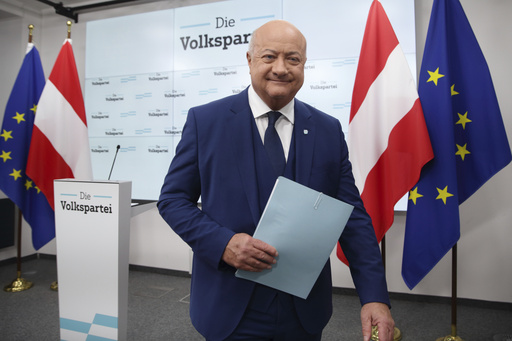
VIENNA — Efforts led by far-right Austrian leader Herbert Kickl to establish a coalition government with the conservative Austrian People’s Party have come to an end, marked by mutual accusations and frustrations, more than four months after his party emerged victorious in a national election.
Last month, Austria’s president mandated Kickl to pursue the formation of a new government—the first led by the far-right party since World War II—after attempts by other political factions to create a governing alliance without the Freedom Party fell short. However, Kickl announced on Wednesday that he would relinquish this mandate, as discussions with the Austrian People’s Party had become increasingly strained in recent days.
Kickl’s anti-immigration party triumphed in the parliamentary elections held in September, capturing 28.8% of the vote and surpassing the party led by then-Chancellor Karl Nehammer, which landed in second place. Nonetheless, in October, President Alexander Van der Bellen initially awarded Nehammer the opportunity to form a new government after his party expressed reluctance to partner with Kickl’s Freedom Party, an approach that was entirely dismissed by other political entities. Following the breakdown of those negotiations, Nehammer resigned, paving the way for interim Chancellor Alexander Schallenberg.
The latest fallout from the coalition talks featured a blame game, with Kickl attributing the collapse to disagreements with the People’s Party. In a letter made public by his party, he cited the inability to resolve contentious policy issues and the division of ministerial responsibilities as major obstacles. “It is with regret that I take this step,” he remarked, indicating that there was little value in further negotiations with the center-left Social Democrats, the only other party that could have facilitated a parliamentary majority with the Freedom Party. “Austria has no time to waste,” he emphasized. His party remains skeptical of the European Union, particularly opposing EU support for Ukraine while advocating for a reversion of some powers back to Austria.
Responding to the situation, Austrian People’s Party leader Christian Stocker reiterated his party’s commitment to national sovereignty and reducing foreign influence, especially from Russia, while maintaining Austria’s standing as a trustworthy partner within the EU and protecting liberal democracy. He voiced concerns about the impact on foreign intelligence collaboration if the Freedom Party were to take charge of the interior ministry. “We cannot compromise the security of our country,” Stocker stated, attributing the collapse of negotiations to Kickl’s approach.
In February 2018, foreign intelligence services stopped sharing crucial information with Austria following an unauthorized police raid on its domestic intelligence agency, which raised alarms that sensitive details could be mishandled. A parliamentary investigation later discovered that Kickl, who was then at the helm of the interior ministry, actively engaged in persuading prosecutors to proceed with the controversial raid. Both the Freedom Party and the People’s Party have been adamant about gaining control of the interior ministry.
Kickl made a detailed statement reflecting on the past weeks of negotiations, stressing his commitment to addressing key issues from his party’s election platform in a prospective administration. Throughout the campaign, the Freedom Party positioned itself as a tougher opponent to asylum seekers and migration policies. “If this had only been about me stepping into the chancellor’s role, I could have seized the moment,” he conveyed, but continued, asserting that such a move would betray voters and violate central electoral promises. He insisted on the necessity of controlling the interior ministry, which he believes is integral to their “key competences of security, asylum, and migration.”
Looking ahead, President Van der Bellen has noted Kickl’s update regarding the failure of coalition discussions, highlighting a diminished willingness to compromise. The president outlined several potential future scenarios, which include calling for new elections—though this is implausible before June due to legal stipulations—forming a minority government, creating a caretaker government with wide parliamentary backing, or making another attempt at coalition negotiations. Van der Bellen plans to engage with relevant political figures to explore which route could be most viable.
Political analysts, including Peter Filzmaier, have described the coalition talks as an unfolding “bizarre drama,” especially after a confidential summary of the negotiations was leaked over the weekend, revealing substantial divergences between the involved parties, particularly in areas of foreign and security policy alongside EU relations. The current political landscape in Austria is quite extraordinary, as the process of forming a government has never been this prolonged. The country is grappling with a declining economy, rising unemployment rates, and an ongoing recession, heightening the urgency for a stable governance structure.

